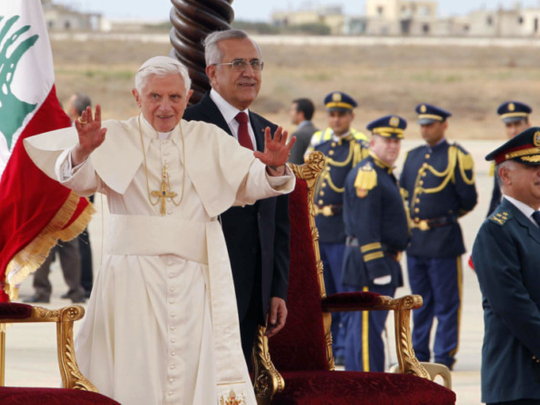
Beirut: Pope Benedict XVI said Friday that his visit to Beirut demonstrated long-standing ties between Lebanon and the Vatican, and stressed how much he valued the Middle East.
“I came to Lebanon to sign the apostolic exhortation prepared by the Special Assembly for the Middle East of the Synod of Bishops,” he said.
The synod, which first met in 2010 and drafted various recommendations to buttress the presence of Christians in the area, apparently addressed various concerns, including threats to religious pluralism in key countries like Lebanon, Syria and Egypt.
It also examined the critical conditions that Palestinians faced in the Occupied Territories.
“The Lebanese people have set an example of diversity and mutual coexistence for the Middle East and the world,” the Pope said, expressing his confidence that its sons and daughters will successfully “confront all challenges that have raged through the years.”
The pontiff avoided the sensitive Syrian question in his opening comments, although his statement that he came “as a friend of God as well as a friend of humanity” inferred that Benedict was deeply concerned about the plight of people elsewhere throughout the region. Observers assumed that Benedict would probably discuss developments in Syria during his upcoming Sunday homily.
The Pontiff called for cooperation between Christians and Muslims, acknowledging that Lebanon’s make-up was sensitive, though he was confident all of its sons and daughters would preserve it.
Lebanese President Michel Sulaiman, for his part, linked the visit with that of Pope John Paul II in 1997 and, more important, with the departure of St. Peter from this land to Rome over 2,000 years ago. He emphasised the importance of this visit, reminding everyone that Lebanon witnessed one of the first miracles performed by Jesus Christ [in Qana], and pledging to continue to stand as a unique model of coexistence and tolerance.
Land of miracles
Ealier, welcoming the Pope, Sulaiman reminded his audiences that Lebanon was a land of miracles and a rare model of coexistence in the world.
“We welcome you in this holy land,” affirmed Sulaiman, “and hope that your visit will bring good to Lebanon and Christians throughout the East.”
The official reception at Rafiq Hariri International Airport, which was shut down for the occasion amid tight security, included the country’s elite, headed by Sulaiman, Speaker Nabih Berri, and Prime Minister Najib Miqati.
Most of the country’s political and religious leaders representing all 18 denominations were present.
Sulaiman also underscored Lebanon’s intrinsic abilities to sacrifice for the sake of its freedom and values and, in a brilliant exhortation, pleaded for a fair and just political solution to the Palestinian Question in general and the responsibilities of the international community to refugees throughout the area.
“Christians and Muslims welcome you,” declared the president, thanking the Pontiff for choosing Lebanon to deliver his message of peace to all the peoples of the region at a time of great tensions.












